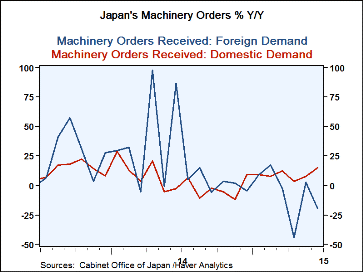 Global| Aug 13 2015
Global| Aug 13 2015Japan's Orders Continue to Disappoint
Summary
Machinery orders in Japan rose by a robust 5% in June. But their three-month growth is still -10.1% at an annualized rate and year-over-year orders are lower by 3.2%. The more closely-watched core orders fell by 7.9% in June, falling [...]
 Machinery orders in Japan rose by a robust 5% in June. But their three-month growth is still -10.1% at an annualized rate and year-over-year orders are lower by 3.2%.
Machinery orders in Japan rose by a robust 5% in June. But their three-month growth is still -10.1% at an annualized rate and year-over-year orders are lower by 3.2%.
The more closely-watched core orders fell by 7.9% in June, falling at a 14.6% annualized pace over three months. They are up by 14.7% year-over-year.
Japan's orders still cannot paint a clear picture of economic recovery. The better appreciated core orders are weakening. The weakness in overall orders is a not a reassuring background.
Orders by source simply create another picture of confusion. Foreign orders are building momentum but still net lower by 20% year-over-year. Domestic orders are simply volatile, down at a 15% pace over three months but up 15% year-over-year.
Japan is still not able to shake the negativism that has engulfed it since having raised its consumption tax.

Robert Brusca
AuthorMore in Author Profile »Robert A. Brusca is Chief Economist of Fact and Opinion Economics, a consulting firm he founded in Manhattan. He has been an economist on Wall Street for over 25 years. He has visited central banking and large institutional clients in over 30 countries in his career as an economist. Mr. Brusca was a Divisional Research Chief at the Federal Reserve Bank of NY (Chief of the International Financial markets Division), a Fed Watcher at Irving Trust and Chief Economist at Nikko Securities International. He is widely quoted and appears in various media. Mr. Brusca holds an MA and Ph.D. in economics from Michigan State University and a BA in Economics from the University of Michigan. His research pursues his strong interests in non aligned policy economics as well as international economics. FAO Economics’ research targets investors to assist them in making better investment decisions in stocks, bonds and in a variety of international assets. The company does not manage money and has no conflicts in giving economic advice.
More Economy in Brief
 Global| Feb 05 2026
Global| Feb 05 2026Charts of the Week: Balanced Policy, Resilient Data and AI Narratives
by:Andrew Cates






